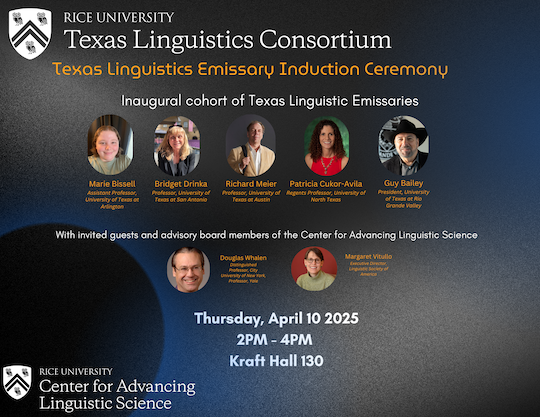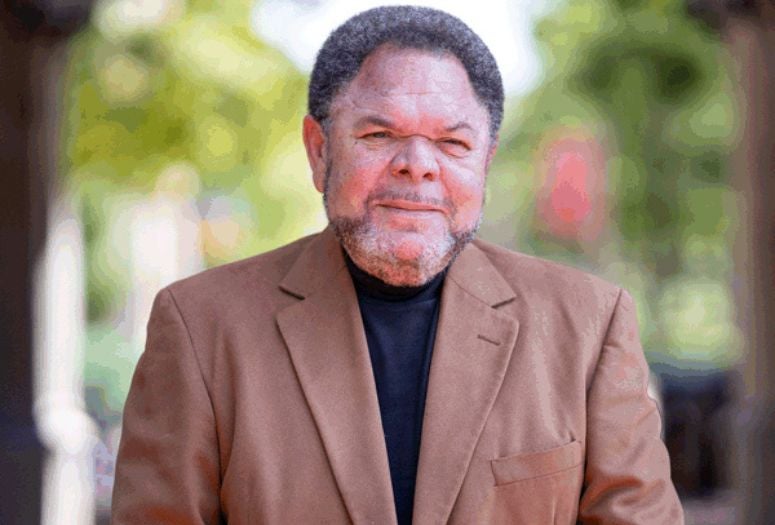Rice University is bringing together some of the state’s brightest minds in linguistics to launch a first-of-its-kind collaboration: the Texas Linguistics Consortium.
Led by sociolinguist John Baugh, the new initiative will unite scholars from across the state to tackle big questions about language, communication and access in one of the most linguistically diverse regions in the country.
“This is a historic moment,” said Baugh, the Barbara Jordan Distinguished Professor of Linguistics. “We’re building a statewide network of top scholars who will serve as a kind of linguistic brain trust for Texas.”
The launch of the consortium coincides with Rice announcing its new Center for Advancing Linguistic Science.
“Rice is home to incredible interdisciplinary work, and the Texas Linguistics Consortium is a perfect example of how our faculty are tackling real-world challenges through collaboration,” said Amy Dittmar, the Howard R. Hughes Provost and executive vice president of academic affairs. “This kind of initiative not only strengthens academic research, it has the power to shape more equitable access to education, health care and civic life.”
The consortium includes researchers from the University of North Texas and the University of Texas System institutions in Austin, Arlington, San Antonio, and the Rio Grande Valley, with Rice as the central hub. Each partner will be represented by a newly designated “Texas Linguistics Emissary,” a title that honors their outstanding scholarship and commitment to public service.

2025 Texas Linguistics Emissaries:
- Marie Bissell — University of Texas at Arlington
- Bridget Drinka — University of Texas at San Antonio
- Richard P. Meier — University of Texas at Austin
- Patricia Cukor-Avila — University of North Texas
- Guy Bailey — University of Texas Rio Grande Valley
Advisory Board, Center for Advancing Linguistic Science:
- Douglas H. Whalen — Founder, Endangered Language Fund and Rice alumnus
- Margaret Vitullo — Executive Director, Linguistic Society of America and Rice alumna
Why build the consortium now? Baugh says it’s simple: Texas is bursting with linguistic diversity, but the state hasn’t always had the infrastructure—or collaboration—to support it.
“A lot of people don’t realize how multilingual Texas really is,” Baugh said. “We have residents from all over the country and the world. But that diversity is often overlooked, and the communication challenges are real, especially in education, health care and technology.”
Those challenges are exactly what the new consortium hopes to address. Whether it’s helping non-native English speakers navigate public services, improving reading education, or demystifying the role of language in artificial intelligence (AI), Baugh says the field of linguistics touches far more corners of everyday life than most people realize.

“Take AI, for example,” he said. “We all use it whether we know it or not, but the tech behind it is rooted in linguistics. Large language models like the ones powering today’s chatbots and digital assistants are built on theories from natural language processing.”
That’s just one example of how linguists are already shaping the future. But Baugh and his colleagues are also focused on more immediate, community-level needs. In fact, one of their first projects involves working with Rice’s Kinder Institute for Urban Research to support native Spanish speakers across Texas who are still building English fluency.
“It’s not just a Houston issue — it’s statewide,” Baugh said. “This is where the consortium can really make a difference.”
He envisions the group operating a bit like a board of directors: guiding research, forming partnerships and responding to the real-world communication challenges facing Texans.
“These scholars are leaders in their field,” he said. “They’re not just advancing research — they’re building bridges between universities and the communities we serve.”
“Language is one of the most powerful forces shaping opportunity and equity,” said Rachel Kimbro, dean of the School of Social Sciences. “By bringing together scholars across Texas, this consortium positions Rice to lead in an area that’s deeply relevant to our diverse communities.”
In addition to research and service, the consortium is looking to expand access to linguistics education across the country, starting with community colleges. Through the Center for Advancing Linguistic Science, the group has submitted proposals to the National Science Foundation aimed at growing the linguistic workforce, especially in light of the AI boom.
“We’ve partnered with community colleges from Manhattan to Monterey to Brenham, Texas,” Baugh said. “We need more people trained in linguistics, and community colleges are key to making that happen.”
For Baugh, this moment also carries personal significance. Though it’s his first year at Rice, his roots in Texas run deep — he began his academic career as a professor at the University of Texas at Austin, where he worked alongside civil rights icon Barbara Jordan.
“Barbara Jordan was one of my colleagues,” he said. “She was a giant, not just for Black Americans but for anyone who believed in justice and equity. It’s an honor to hold a professorship in her name and carry that spirit forward.”
He also gave credit to Rice leadership for supporting the launch of the consortium and the bold vision behind it.
“Rice may be small, but it has global impact,” he said. “The fact that we’re leading this effort says a lot about the kind of institution we are.”
As the consortium gets underway, Baugh is already thinking ahead. In the next three to five years, he said he hopes the group will not only strengthen academic research but also help shape policies and programs that serve everyday Texans.
“We want this work to matter,” he said. “To students, to families, to people navigating systems in languages that aren’t their own. That’s the heart of what linguistics is all about: understanding how we communicate and making sure no one gets left behind.”

